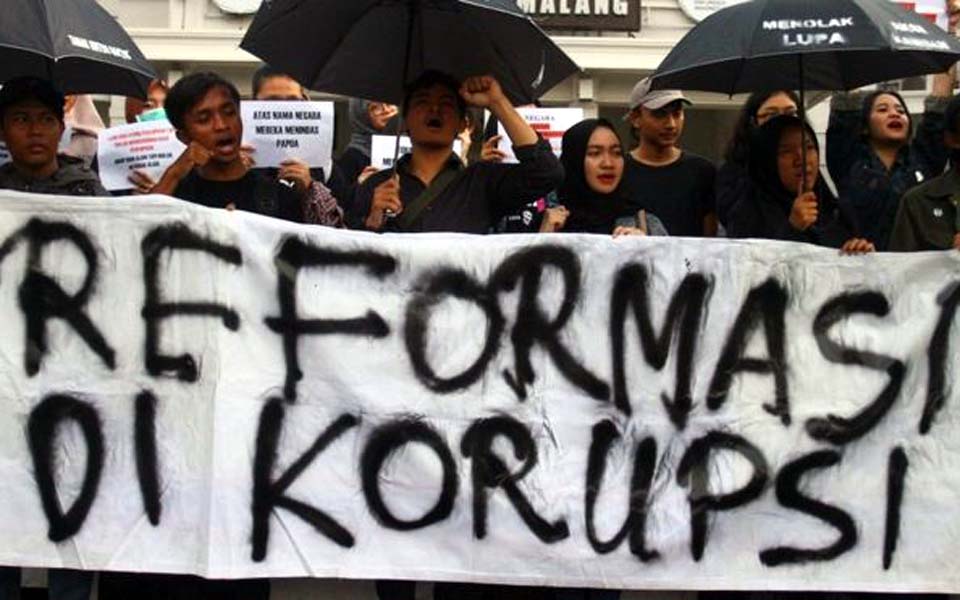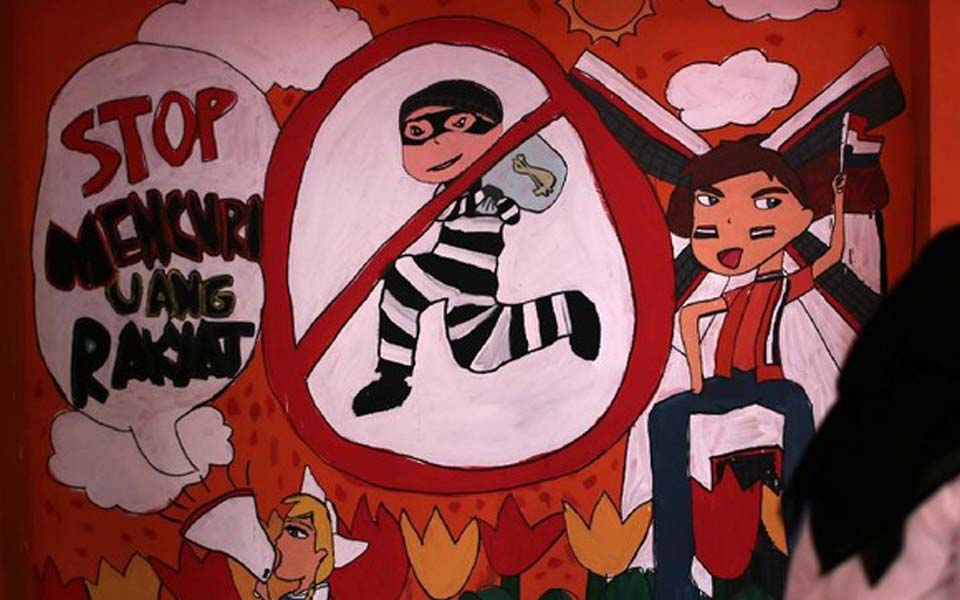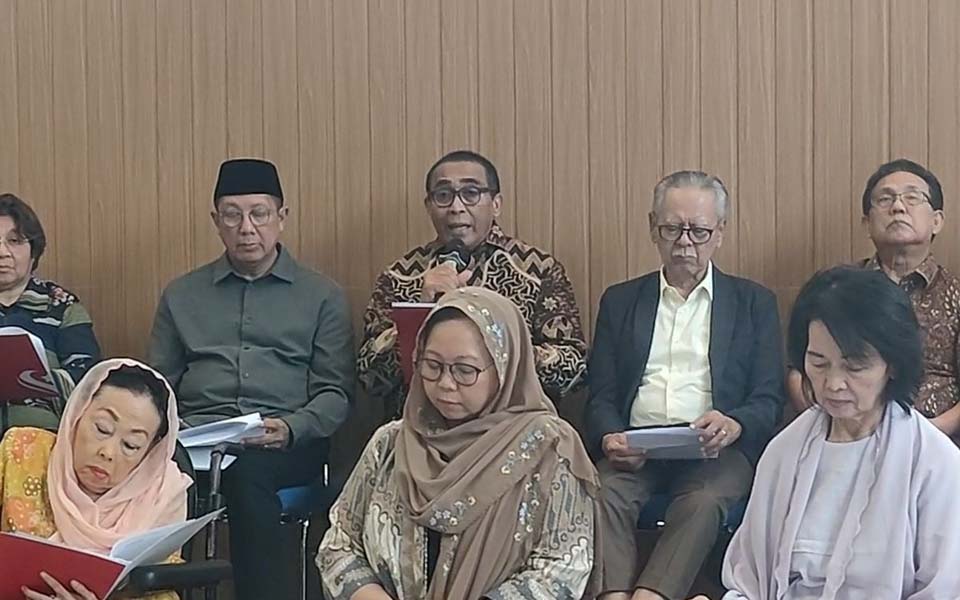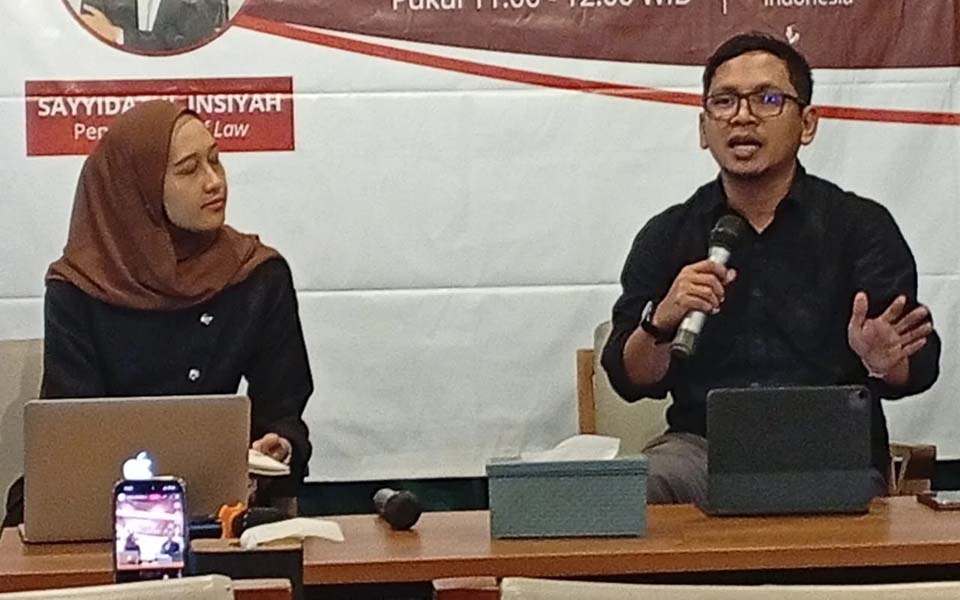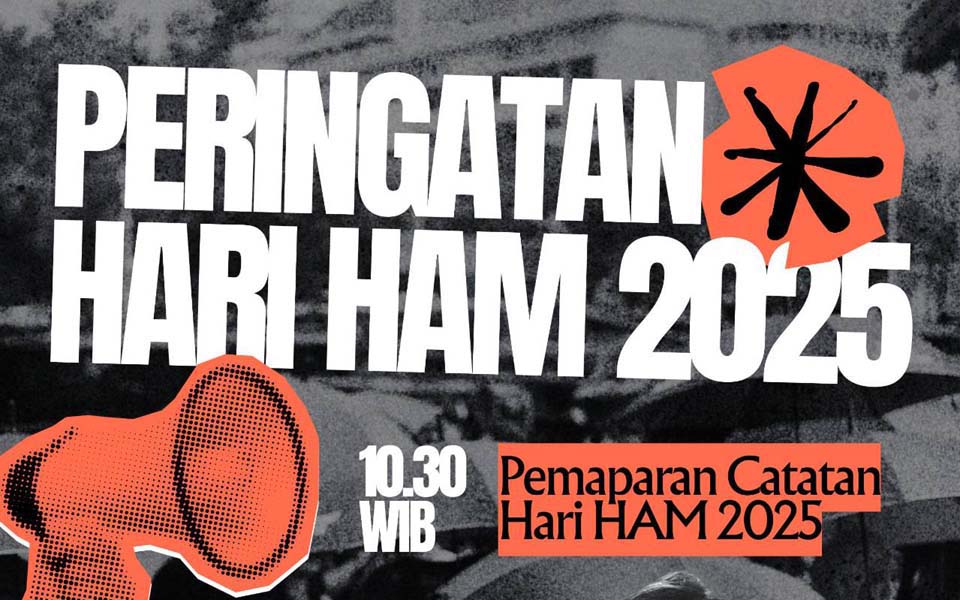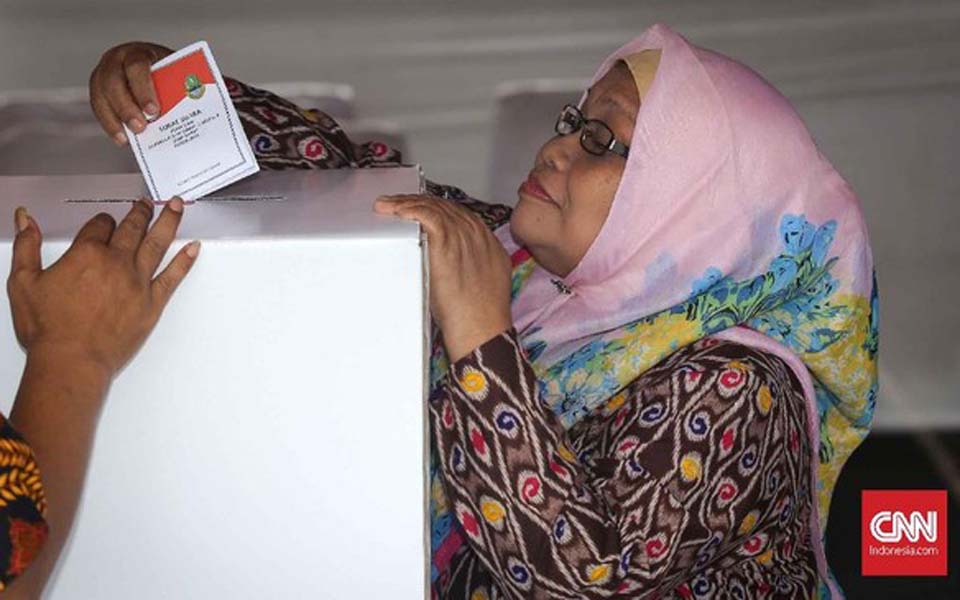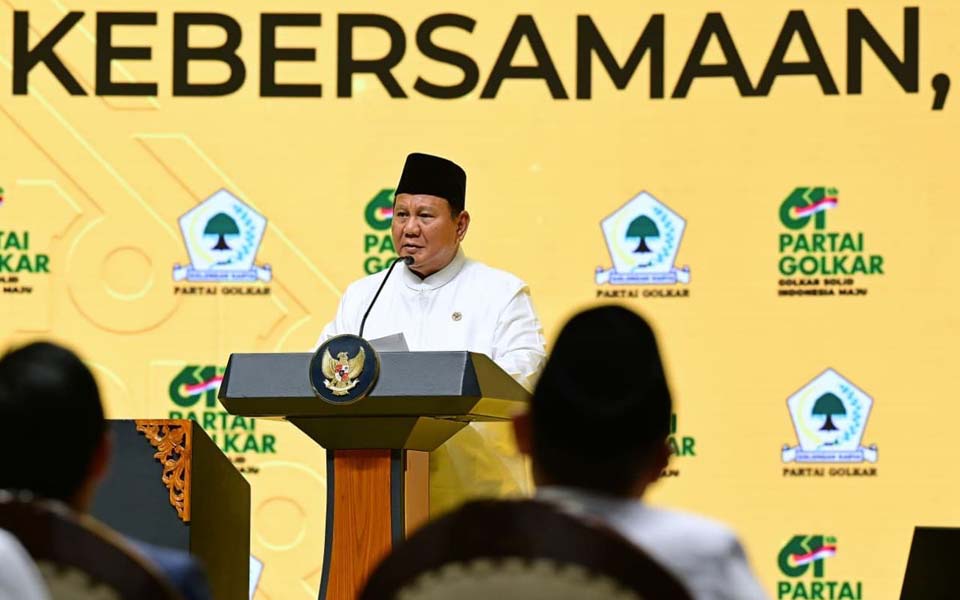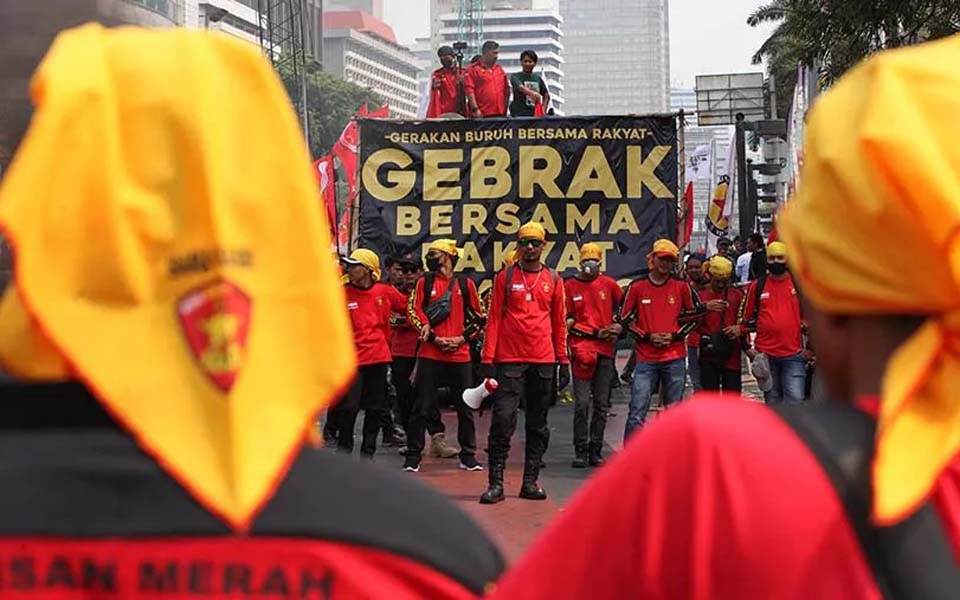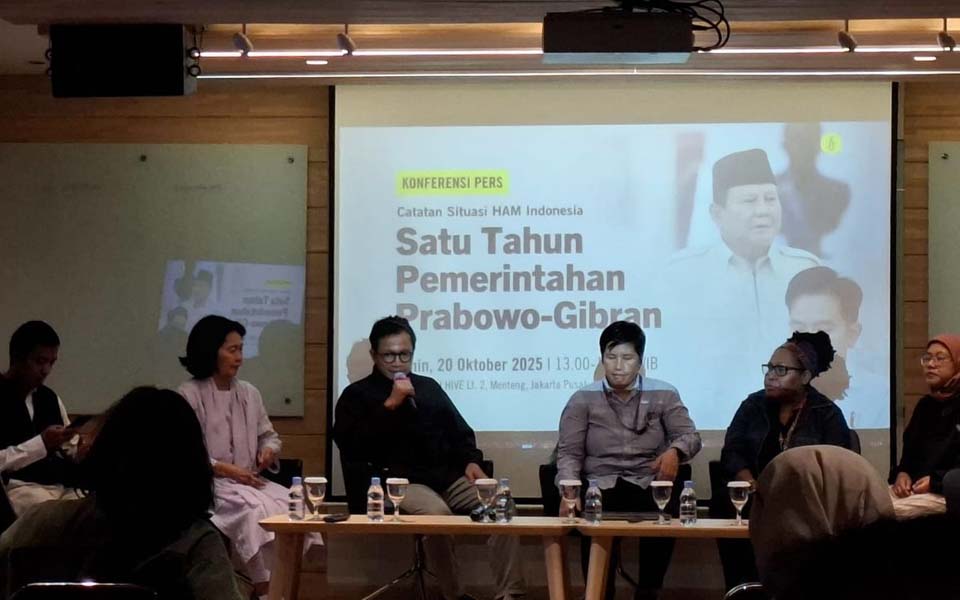As the 2014-2019 term was coming to an end, the House of Representatives (DPR) were persistently trying to pass through a variety of draft legal revisions. Revisions to the Corruption Eradication Commission Law (UU KPK) have the potential to weaken the KPK by decreasing the level of authority it has formerly held and could even debilitate the work that it carries out.
The Draft Indonesian National Criminal Code (RKUHP) provides a picture of how the ruling class will criminalise oppressed groups such as women, people who revolt, Lesbian, Gay, Bisexual and Transgender (LGBT) communities, journalists, activists, the urban poor and many more while on the other hand actually easing punishments for corruptors, institutions and corporations.
Meanwhile, the Draft Bill Correctional Institutions (RUU Pemasyarakatan) would remove restrictions on the granting of remission for people convicted in corruption cases. Large-scale remission can be awarded as well as the right to conditional leave, which can be used by corruptors to escape jail. In the draft changes to UU No. 4 2009 on Mineral and Coal Mining (RUU Minerba), there is not a single provision allowing people to resist once mining investments have been made. 99% of these Draft Bills (RUU) merely talk about mining licenses that are useful for corporations.
The Draft Bill on Land (RUU Pertanahan) strengthens the bargaining position of both the state and corporations in agrarian affairs. People that live in urban places will not be able to avoid eviction if the land that they live on is in conflict with Spatial and Zoning Plans (RTRW). Those who defy this will be criminalised. The Draft Bill on Cyber Protection and Security (RUU KKS) will be administered by the State Cyber and Cryptography Agency (BSSN). The BSSN can legally tap telephone conversations, open messages, read emails and carry out other such activities against anybody.
Furthermore, the Indonesian Forum for the Environment (WALHI) has outlined four problematic aspects of the Law on Water Resources (UU SDA). Firstly, the conversion of water into a commodity so that it can legally be transformed into capital by corporations. Secondly, the UU SDA will not adopt the Regulation on the Protection and Management of the Environment. Thirdly, there is not a body with the authority to take care of water resources. Fourthly, the new Regulation does not allow for reviews and audits of licenses or concessions that have already been issued.
The Regulation for Sustainable Agricultural Cultivation Systems (SBPB) will significantly harm small-scale farmers that farm using genetic resources as they will have to report to the Government via the Agricultural Official (Dinas Pertanian). Farmers will no longer be free to grow new varieties or be creative with their farming because the government will organise everything from the seeds to the fertiliser. Farmers that carry out activities outside the wishes of the government will be criminalised under the UU SBPB.
In the Regulation on Management of National Natural Resources (PSDN), the military will be able to take control of resources from people even if they are not state-owned. This includes the militarisation of civil life via the National Defense Program (Program Bela Negara). Meanwhile, the Information and Electronic Transactions Law (UU ITE) has already been used many times to suppress freedom of opinion and silence criticism. The majority of those who use the UU ITE are capitalists and officials.
Furthermore, the plan to revise the Labour Law (Rencana UU Ketenagakerjaan) will create the conditions for a more flexible labour market. It will make it easier to pay workers less without also providing them with job security. Jokowi will also increase the premiums for the Social Security Management Agency healthcare programme or BPJS by twofold as of 1 January 2020. Subsidies for customers of 900 VA electricity will also be revoked.
Jokowi has persistently attempted to change policies that he feels obstruct the entry of foreign investment. Most recently, there are over 72 laws that will be revised to make it easier for foreign companies to invest capital in Indonesia. On Sunday night (14/07/19) at the Sentul International Convention Centre (SICC) in Bogor, Jokowi delivered his first speech after the presidential election under the banner ‘A vision for Indonesia’. In the section relating to investment, Jokowi said, “...we must invite as much investment as possible in order to open up employment opportunities. Stop this allergy towards investment. Through these means, the opportunities for employment will be opened as large as possible. Accordingly, all which hampers investment must be cut, albeit sluggish licensing, complicated intricacies, let alone under the table payments. Be careful, as we move into the future it is certain that I will chase, I will control, I will check and I will beat up if necessary”. Two days after that, the Minister for Finance Sri Mulyani complained that investment has declined due to democratisation. “Before, when the government was very authoritarian, investments flowed in. Because we are democratic, our capacity to create a good investment climate has decreased”.
These policies were met with resistance from the people. Waves of demonstrations began to spring up as early as late September. Thousands, if not tens of thousands of university students, students, lecturers, workers and other people took to the streets. Demonstrations took place in more than twenty cities. In the Central Java city of Yogyakarta, a mass of tens of thousands launched an action in Gejayan which constituted the largest action since reformasi– the political reform movement that began in 1988.
What is happening now looks truly like an eruption. Many of the actions were called only a day or two before they went ahead. Even so, thousands, if not tens of thousands of the people were mobilised. This eruption, which appeared so suddenly, stemmed from the issue of revising the UU KPK which was seen as weakening corruption eradication.
The basis of this sudden eruption is a dialectical process which began a long time ago wherein all which had been struggled for during reformasi in 1998 has been more and more eroded. This was evident in the various demands which appeared within these mass actions. Rejection of revisions to the UU KPK, the Draft Criminal Code (RKUHP), various other draft laws (Ranganan UU), the increased premium for the BPJS health programme, the militarisation of Papua and the detention of Papuan activists, the ratification of the Draft Bill on the Elimination of Sexual Violence (RUU PKS), etc. About a month earlier, the issue of racism, detention of activists and militarisation in Papua had also been growing. The issue of revising the UU KPK became an opening for the masses of people to see the various issues which were previously hidden.
The movement which developed was the initiative of young people, especially university and other students. These young people, that are often called the apolitical millennial generation, suddenly leaped forward and initiated the political struggle. Layers which previously were either not or minimally involved in action have become active. Lecturers and campus bureaucrats also either permitted or supported the action. Look at the spontaneous character of the movement which developed. Banners, posters and slogans were the initiative of young people themselves and were often done in a humorous, meme-style way. The diversity from campus to campus or from city to city illustrates that there is not yet any national coordination. Yet their writings often describe something very personal which shows deep unrest towards the current situation.
This spontaneity also demonstrates that the organisational strength of the people and the workers is still relatively small. This is despite the fact that there were trade unions, student organisations, progressive political groups and left-wing or socialist groups also involved in the movement.
The regime responded to the development of this movement of young people by unleashing repression. More than 1,200 young people were arrested or injured. It was not uncommon that those injured had been beaten, tortured or even run over by armored vehicles. As well as that, hundreds of people were named as suspects or ‘disappeared’, dozens of journalists were persecuted and at least six young people lost their lives because they were persecuted or because they were shot with live ammunition. Jokowi also asked the Ministry of Research, Technology and National Innovation (Menristekdikti) to penalise university rectors that could not muffle the student mobilisation. The minister, Mohamad Nasir, asked students to return to their campus and start learning.
As we analysed in Arah Juang edition 67 ‘The Results of the 2019 Election’, there are not even the remnants of progressives endorsing Jokowi. Their efforts to provide criticism are extremely minimal, let alone are they involved in the struggle against these policies. Jokowi and his supporters accuse the youth movement of being ridden with the interests of reactionary groups such as Hizbut Tahrir Indonesia (HTI), The Islamic Community Forum (FUI) and the Islamic Defenders Front (FPI). However, these reactionary groups have never constituted an independent force, they have always attached themselves to whichever faction of the bourgeois is in power. What they upheld during the ‘212 Islamic Defenders Action to Rescue the Unitary State of the Republic of Indonesia (Aksi Mujahid 212 Menyelamatkan NKRI) was characteristically more closely aligned with the bourgeois class than the youth movement. Their demand that Indonesia (NKRI) be rescued from the threat of liberalism and communism is in line, at the very least, with the contents of the RKUHP and the postponed ratification of the RUU PKS. The RUU PKS, which provides legal protection from sexual violence, is opposed because it is seen as providing space for sexual freedom. On top of this, the RKUHP criminalises communism, Marxism and Leninism.
It is possible for different factions of the ruling class to use the struggles carried out by young people, workers and other oppressed people for their own advantage. They attempt this co-optation for their own personal interests. We saw this during reformasi in 1998 as students and ordinary people shed blood in the struggle while the outcome was seized by ‘loyal opposition’ figures Megawati Sukarnoputri, Amin Rais and other such people. The bourgeois were afraid of the independence of the mass movement and tried as much as they could to preserve the remnants of Suharto’s military regime so that they could obtain power for themselves.
Another way that the youth movement is justified and shown to be pure and not corrupted is to point out that there is not a demand which calls for the bringing down of Jokowi. Such a demand, according to Jokowi’s supporters, would be in the interests of reactionary groups. However, these efforts obstruct the development of consciousness among students and oppressed people. The realisation that Jokowi is just another component of the ruling class. It is the ruling class which suppresses democracy and impoverishes the people.
The growth of the youth movement provides an early picture of the significant changes that could potentially be won. However, the spontaneous character has also prevented the realisation of this potential.
Young people have been confronted with questions of tactic and strategy. What needs to be done now in order to win our demands? What needs to be done in order to confront the repression carried out by the ruling class? How can we organise the movement so that it is more broad, strong and large? Finally, the most important question: if the young people declare a vote of no confidence in the ruling class, then who will replace them? What will replace them?
We must fight as well and as respectfully as possible. Resist in the streets, resist the repression of the ruling class, resist on campuses and resist in the classrooms. What is also of the utmost importance in this struggle is providing answers to questions of tactic and strategy. The best way to do that is for all young people, university students, students and workers to conglomerate into a revolutionary socialist organisation. A revolutionary socialist organisation is the manifestation of the working class. The experiences of workers and other oppressed people throughout all parts of the world and during all periods of history is studied in order to provide answers as to what must be done in the current situation as well as the tactics and strategies we need to employ at this time. Furthermore, a revolutionary socialist organisation will coordinate the struggle and lead the working class and oppressed people to victory.
A movement cannot be understood other than as a contested site of different ideas and perspectives. Such is the case with this current movement. Right-wing groups, including those brought together through intra-campus organs associated with Indonesian Muslim Students Action Front (KAMMI) and the Islamic based Justice and Prosperity Party (PKS) refuse to support the demand for the ratification of RUU PKS. In a variety of places, they have successfully controlled newly-formed alliances so that they do not support the ratification of RUU PKS. Meanwhile, moderate groups have sought to use reformist methods such as mediation, asking members of parliament for statements (pernyataan sikap) or peaceful actions. In general, they also organise around intra-campus organs. This also includes a reluctance to support issues related to Papua, in particular the right to self-determination.
Sometimes arguments are upgraded by postmodernist thinking which is so dominant in the intellectual world. This way of thinking ignores the existence of class struggle and only emphasises the conflict of narratives. Simply presenting demands or narratives is not the way to actually win those demands. All that they can do is celebrate the diversity which emerges from mass action while preventing a radical struggle that targets the centres of political and economic power.
Both Jokowi, whose commitment to democracy would never be called into doubt, and the nationalist Prabowo Subianto both hold the same vision in relation to democracy and the wellbeing of the people: suppression and impoverishment. Both sides’ agreement on the legal changes to investment, as well as their histories, illustrate this. When reformasi took place in 1998, there were ‘opposition’ political elites such as Megawati and Amin Rais that salvaged Suharto’s military regime. Until now, these remnants of Suharto’s military regime are still given positions and power.
We do not believe in the DPR, we do not believe in Jokowi or the entire ruling class. They come to power through the suppression of democracy, through the barrel of a gun, planned riots, racism, sexism, murder, kidnapping, colonisation, rape and the impoverishment of the people. We must abandon all of this historical garbage. It is the only way that the working class and the Indonesian people can advance. There is already an appropriate slogan: vote of no confidence! (Mosi Tidak Percaya!)
In order to do that, we need to build unity with workers, farmers, women, West Papuans and all other oppressed people. Specific attention must be given to the working class. As the class most embedded within the capitalist mode of production, they hold a strategic position. A strike involving tens of thousands of people would inflict a heavy blow to the ruling class. It will improve the likelihood of victory.
Demands must be put forth clearly and firmly to increase the likelihood of this unity in struggle. Demands that are connected to the concrete situation, that respond to the pressing concerns of the masses and that are able to mobilise the masses which includes raising the consciousness of the masses in order to challenge the illusion of ‘the tadpole and the bat’ –derogatory terms used by Jokowi and Prabowo supporters. These demands include: stop, without delay, the Draft Criminal Code, the Draft Law on Correctional Institutions, Draft Law on Land and the Draft Bill on Mineral and Coal Mining. Stop the Jokowi-business people’s revision of the Labour Law, the Draft Law on Cyber Protection and Security and cancel revisions to the KPK Law. Detain, try, jail and confiscate the property of corruptors! Withdraw the Regulation on Water Resources, the Regulation for Management of National Natural Resources, the Regulation for Sustainable Agricultural Cultivation Systems and the Information and Electronic Transaction Law. Ratify the Draft Bill on the Elimination of Sexual Violence (RUU PKS) as well as the Draft Law on the Protection of Domestic Workers (RUU Perlindungan Pekerja Rumah Tangga).
Withdraw all organic and non-organic elements of the military from Papua. Release and end the criminalisation of Papuan activists Charles Kossay, Dano Tabuni, Ambrosius Mulait, Isay Wenda, Ariana Lokbere, Surya Anta, Buchtar Tabuni, Cristopher Wili, Ferry Kombo, Sister Mandabayan, Agus Kossay, Veronica Koman and Dhandy Laksono. Grant the right to self-determination as a democratic solution for the people of Papua. End the burning of forests in Kalimantan and Sumatera that is carried out by corporations! Arrest, try, fine, imprison and revoke permission for business people and corporations that burn forests! Imprison the generals that have violated human rights! Suharto-in absentia: Prabowo, Wiranto, Hendropriyono, Sutiyoso, etc.
Ever since reformasi in 1998, a variety of similar demands have emerged. However, the ruling class (or their factions) have demonstrated that it is impossible to achieve these demands through reformist means. This includes peaceful measures that limit themselves to the formal legal framework of current laws, methods that seek only to raise one’s voice or the technique of sending statements to members of parliament. We need to break through, attract mass involvement in real struggle by expanding and resurrecting the struggle for every democratic demand including the struggle of the working class against the ruling class. Consistency and persistence will be crucial for the youth movement to win these demands.
Action committees and command posts must be established at the lowest level as well as within the midst of the masses such as in campuses, faculties, kampungs, factories etc. Both will function to consolidate power from the grassroots as well as to organise resistance. Among other things this will include clarifying the demands of the struggle, launching actions in campuses, factories as well as in kampungs and pushing forward the spontaneous character that exists at the start of movements which become more organised.
[Translated by Armando Dharta. The original title of the article was “Reformasi Dikorupsi: Kelas Berkuasa Memberangus Demokrasi, Memiskinkan Rakyat”.]
Source: Arah Juang print edition Number 69, July 2019





